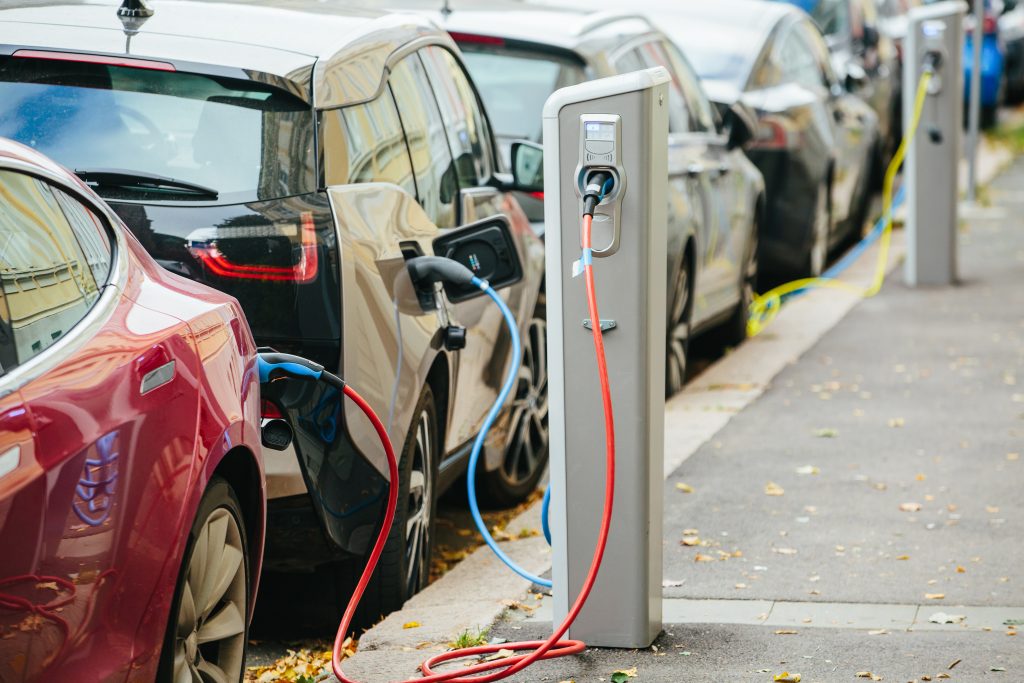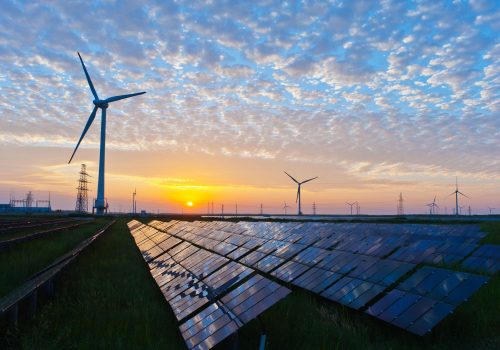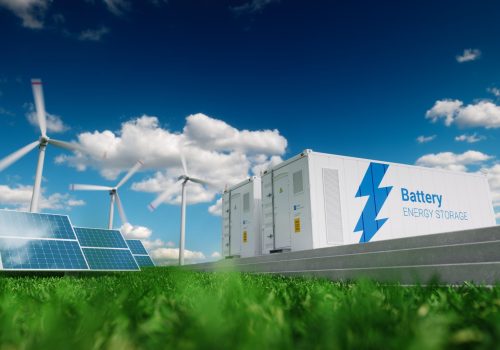This is part of an essay series on the mutual challenges posed by climate change and opportunities presented by the energy transition that the Gulf Cooperation Council (GCC) and Turkey share.
This article explores the ambitious environmental targets set by Turkey and the Gulf Cooperation Council (GCC) nations. Transportation emissions are a significant concern, and both regions are focusing on renewable energy, electric vehicles (EV), and innovative technologies to drive sustainable practices. This article highlights the potential for collaboration between Turkey and the GCC in renewable energy and EV adoption, as well as the importance of energy storage and carbon-capture technologies. The focus lies in elucidating the significance and interconnectedness of these key components within the broader energy landscape, with the imperative role of EVs in the context of overall carbon-emission goals, renewable energy as a source of electricity to EVs and carbon capture where complete decarbonization is challenging, and energy-storage systems to enhance reliability of renewable resources. By analyzing and understanding these focal points, the article aims to provide valuable insights into the evolving energy paradigm and its implications for a more sustainable future for both regions.
Renewable energy and transportation emissions
In April 2023, Turkey unveiled an ambitious update to its Nationally Determined Contribution (NDC) targets, setting a commendable course for environmental action. It made a firm commitment to reduce its greenhouse-gas (GHG) emissions by a substantial 41 percent measured against the 2012 baseline, which was previously 21 percent, by 2030. This new emission-reduction target equates to 695 million tons of carbon dioxide (CO2) in the year 2030, which would otherwise be 1,175 million tons. Moreover, Turkey is embracing a forward-looking vision by setting a target to attain net-zero emissions by the year 2053. The GCC nations have established ambitious environmental goals, aiming for zero emissions by 2050 in the cases of the United Arab Emirates (UAE) and Oman, and by 2060 for Saudi Arabia, Kuwait, and Bahrain. Qatar, while not currently committing to a zero-emission target, is focused on achieving a substantial 25-percent reduction in emissions by 2030.
The journey toward reduced emissions is a multifaceted one, and Turkey is taking significant steps to address its emissions profile. While the energy and industrial sectors are the major contributors to emissions, chiefly through coal utilization, it is noteworthy that the transportation sector plays a pivotal role, accounting for approximately 16.6 percent of the nation’s emissions as of 2021. Also, renewable energy is already a significant part of electric generation, with almost 52.8 percent of Turkey’s energy coming from solar, wind, hydropower, and geothermal, and with solar and wind covering 21.3 percent of installed capacity as of September 2023. Turkey has a target of supplying 64.7 percent of its installed electricity capacity from renewable resources by 2035.
GCC countries’ heavy reliance on oil and gas requires them to pursue a diversified energy strategy that incorporates clean-energy sources, natural gas, clean coal, and nuclear power. The UAE set a significant investment of $54 billion in renewables to reach net zero by 2050. Dubai’s renewable-energy expansion includes extensive solar initiatives such as Mohammed bin Rashid Al Maktoum Solar Park. Approximately 14 percent of its electricity comes from clean sources, and it aims to reach 25 percent by 2030. The forthcoming COP28 Conference in Dubai is expected to bring together key stakeholders, facilitating discussions and actions aimed at enhancing sustainability efforts in the region. Although Saudi Arabia has a limited presence in renewable resources, it is in the process of constructing the world’s largest solar facility, with an expected completion date in 2025, and aims for 50 percent of electricity to be sourced from renewables by 2030. In the UAE, transportation was the third-largest source of emissions, contributing to approximately 19 percent of the total. In Saudi Arabia, transportation was the second-largest source, responsible for 26 percent of emissions, while it ranked third in Qatar, making up 13 percent of emissions. In all three countries, electricity and heat remained the leading sectors of emissions.
As Turkey advances toward its emission-reduction targets and embraces cleaner transportation alternatives, the synergy between electric mobility and renewable energy will undoubtedly play a crucial role in shaping its sustainable future. Almost 95 percent of its transportation emissions come from road transportation—mainly diesel-powered vehicles. Similarly, in GCC countries, road transportation has produced a significant amount of transportation emissions—more than 90 percent on average—revealing the potential for improvement as alternative powertrain technologies evolve.
Adoption of alternative powertrain vehicles/electric vehicles
Turkey has been quickly adopting EVs despite global supply-chain issues that stem mainly from chip shortages, wire-harness supplies halted due to the Ukraine-Russia conflict, steep inflation that impacted vehicle prices, and interest rates that went beyond 40 percent for vehicle credit/loans as of 2023. Year-over-year growth in adoption of plug-in hybrid and electric-battery light vehicles was around 188 percent in 2022 and was expected to grow further in 2023.New models enter the market each year, including locally produced TOGG EVs that became commercially available in 2023. This shows a dedicated localization of lower-emission transportation, as Turkey is imposing an import tax of around 40 percent on imported vehicles and protects competition within the local market. Turkey is encouraging the adoption of EVs by offering reduced special consumption tax (SCT) between 10 to 60 percent, in contrast to the typically high SCT imposed on their internal combustion engine (ICE) counterparts that normally ranges between 45 to 200 percent. The charging infrastructure has been improving consistently, and the number of companies licensed to install and operate charging stations has increased to 124, with the total number of charging stations having reached 4,221 as of 2023. Alternative powertrain technologies are being explored, with a focus on hydrogen-powered vehicles to attain net-zero emissions. The limited availability of hydrogen-fueling infrastructure poses a challenge for the widespread adoption of hydrogen-powered light vehicles. However, buses operating on fixed routes are considered early adopters of this technology, as they can overcome the infrastructure limitations more effectively. Turkey is also partnering with international vehicle and parts makers, such as Ford and LG Chem, to locally manufacture batteries that will bring in EV technology capability.
GCC countries have initiated the adoption of EVs, beginning with government-driven purchases. Notably, the Dubai government has set a target to make 30 percent of its government fleet electric by 2030. Dubai has established a new manufacturing hub dedicated to the local production of EVs and is planning to export to Egypt, Tanzania, Senegal, Mali, and Kenya. Presently, just 1 percent of vehicles in the UAE run on batteries, but the country aims for 50 percent of vehicle sales to be EVs by 2050. In 2022, Saudi Arabia imported approximately fourteen thousand EVs due to the absence of local automotive manufacturing. Nevertheless, the country’s recently unveiled Vision 2030 plan seeks to reduce its dependence on oil. Meanwhile, Qatar is actively developing its local EV brand, EcoTranzit, with the goal of EVs constituting 10 percent of total vehicle sales by 2030. As EV adoption is dependent on infrastructure, green-hydrogen production is also being discussed in GCC countries, due to presence of valuable, renewable electricity-deployment potential from natural resources and low-carbon hydrogen from the vast amount of hydrocarbons.
Collaborative projects or partnerships between Turkey and GCC countries
Both Turkey and the GCC are committed to achieving significant reductions in emissions, which will have a profound impact on their economies. Collaboration between these regions will accelerate the transition toward an improved quality of life for their residents. This transition will necessitate substantial investments and the reallocation of resources from various sources, including public, private, and international funds. Key areas of focus for this collaboration include renewable-energy production and the adoption of EVs.
One noteworthy synergy between EVs and renewable energy is energy storage. The efficient utilization of installed solar and wind facilities can play a pivotal role in facilitating a broader adoption of energy from renewable resources. Turkey, for instance, has recently made energy storage a requirement for licensing solar and wind-energy production applications. However, due to limited financial incentives and rising costs, some companies interested in transitioning have postponed their installation plans. The demand for these licenses is exceptionally high, and numerous local companies are already manufacturing energy-storage systems ready to serve various sectors, including residential, commercial, and utility-scale applications. The GCC nations have the opportunity to maximize their investments by leveraging the growing expertise in Turkey. They can contribute to the advancement of Turkey’s energy system and play a pivotal role in enhancing the integration of EVs into the electricity grid. Furthermore, Turkey has long held substantial potential in the production and advancement of solar panels, and currently ranks fourth globally in solar-panel production capacity.
Carbon capture is another domain in which Turkey can gain valuable insights and technology from GCC countries, given the extensive industrial applications already in place. Turkey’s heavy industries constitute the second-largest source of carbon emissions, making carbon-capture technologies particularly relevant. The emerging clean-hydrogen industry in Turkey can benefit from the GCC countries’ abundant hydrogen resources and their applications of carbon capture in making hydrogen cleaner, facilitating a faster adoption of this technology.
Recent meetings between the leaders of Turkey and the GCC countries have resulted in agreements to collaborate in various renewable-energy sectors, including wind turbines and solar panels, with an estimated direct investment of approximately $30 billion from GCC countries. Furthermore, collaboration in areas such as carbon capture and energy-storage systems is on the agenda, marking a promising step toward a more sustainable and environmentally friendly future for both regions.
Conclusion
The commitment of both Turkey and the GCC countries to reduce emissions and embrace sustainable energy solutions is commendable. Their joint efforts in renewable energy, EV adoption, and knowledge sharing hold the promise of a more environmentally friendly and economically robust future. Recent agreements between these regions, coupled with a focus on carbon capture and hydrogen technology, underscore the collaborative approach to addressing climate change and advancing clean-energy practices. Through these partnerships and individual initiatives, they are on a path to achieving their ambitious environmental goals while promoting a more sustainable and prosperous future for their residents.
Melek Öztürk is a Principal Research Consultant at The Electric Vehicle (EV) Exchange
Further reading
Fri, Dec 8, 2023
Charting energy transitions in the Eastern Mediterranean and Arabian Peninsula
Report By
While Turkey and the GCC have different renewable energy motivations, they need to evolve and combine experience and resources for energy security and sustainability.
Fri, Dec 8, 2023
How GCC and Turkey can go together toward a sustainable future
Report By Eser Özdil
While Turkey has ambitious green-energy transition strategies and projects, they need to cooperate with the GCC to overcome the financial and capacity challenges.
Fri, Dec 8, 2023
Forging a collaborative energy transition between GCC and Turkey
Report By
Turkey and the GCC cannot self-achieve energy transition. Nations need to plan how to join forces for diversifying energy sources and reducing carbon footprints in the region.
Image: Electric vehicles charging on the street (Scharfsinn/Shutterstock)




Follow the conversation on X, formerly known as Twitter, with @AC_Istanbul and @AtlanticCouncil using #ACTurkey and #ACatCOP28